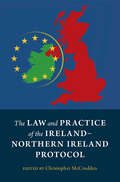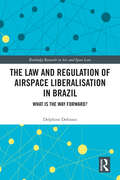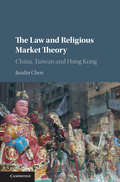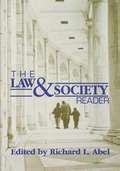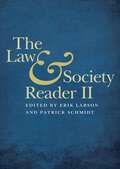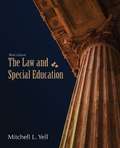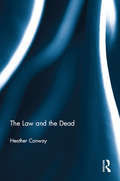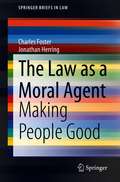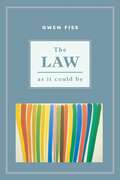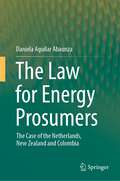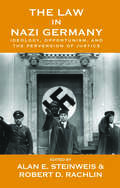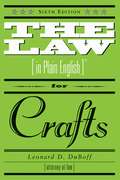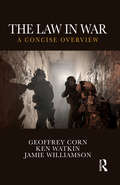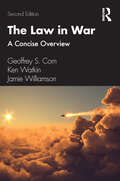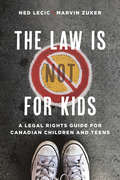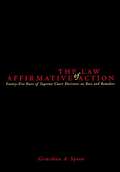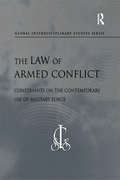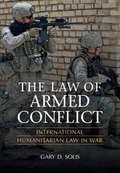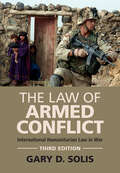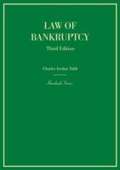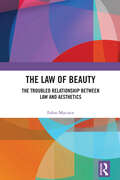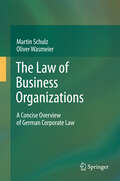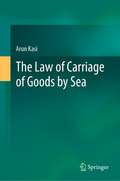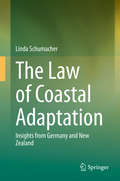- Table View
- List View
The Law and Practice of the Ireland-Northern Ireland Protocol
by Christopher McCruddenThe Ireland-Northern Ireland Protocol, part of the Withdrawal Agreement concluded between the European Union and the United Kingdom, is intended to address the difficult and complex impact of Brexit on the island of Ireland, North and South, and between Ireland and Great Britain. It has become an exceptionally important, if controversial, part of the new architecture that governs the relationship between the UK and the EU more generally, covering issues that range from trade flows to free movement, from North-South Co-operation to the protection of human rights, from customs arrangements to democratic oversight by the Northern Ireland Assembly. This edited collection offers insights from a wide array of academic experts and practitioners in each of the various areas of legal practice that the Protocol affects, providing a comprehensive examination of the Protocol in all its legal dimensions, drawing on international law, European Union Law, and domestic constitutional and public law. This title is also available as Open Access.
The Law and Regulation of Airspace Liberalisation in Brazil: What is the Way Forward? (Routledge Research in Air and Space Law)
by Delphine DefossezThe book starts from the premise that the current aviation framework, in Brazil, cannot sustain a full liberalisation in the long run. While the competition rules in place offer a strong framework, which only requires small modifications, these rules are not "enough" to foster a "healthy" liberalisation. In fact, until recently, Brazilian airlines were operating in a homogenous market, where competition was artificial. This artificial competition, obtained through the imposition of a legal obligation to provide water and a snack and grant a 23kg bag allowance, has resulted in a highly concentrated domestic market with very few players. Compared to other same size markets, such as China or India, Brazil is far behind in terms of airlines operating at national level. Consequently, the opening of the domestic market must be closely regulated to avoid national carriers suffocating under external pressure. For this reason, state intervention during the liberalisation process is crucial. State intervention is also with regard to the protection of passengers. The other major problem is the protection framework for passengers which is much too uncertain and burdensome. In a sense, it is detrimental to the domestic market and passengers. Indeed, there is no harmonisation of passenger compensation leading to contradictory judgments and possible high moral damages which hinders legal certainty for airlines. Compared to the situation in the EU, in Brazil, airlines have a limited range of defences, which are often dismissed by courts. This book, therefore, critically analyses the policies and regulations in place by mainly comparing the Brazilian framework to the European one. This choice has been motivated by the fact that European liberalisation is considered the best so far, and as Brazil is starting this process much later, it could benefit from the European experience. This book will be of particular interest to scholars and practitioners interested in the Brazilian system.
The Law and Regulation of Public Health: Global Perspectives on Hong Kong (Routledge Studies in Asian Law)
by Eric C. IpPublic health law has been a subject of much controversy and contestation, especially since the COVID-19 pandemic broke out. This timely book inquires into the foundational principles of a form of public health law that takes seriously the inherent dignity of the human person. Written from a multidisciplinary perspective, this illuminating study makes the case that the rule of law, just as much as population health, is an essential determinant of human well-being. Choosing the case of the Hong Kong Special Administrative Region of the People’s Republic of China, where life expectancy is among the highest in the world, yet whose well-established rule of law tradition is oft perceived to be under strain, in describing the central dilemmas of public health law, it makes an original contribution to our knowledge of comparative public health law and public health ethics. Situating Hong Kong’s public health law in the context of global health, The Law and Regulation of Public Health should appeal across the world to students and scholars of public health, medical law, public law, comparative law, and international law. It accessibly explains the law to epidemiologists and public health policymakers, and public health to jurists and legal practitioners. This book lucidly urges professionals of public health and law to reflect on how the myriad legal instruments and legal institutions should best be used to promote and protect public health in ways that are at once ethical and lawful. It is a must read for anyone who is interested in gaining insights into public health law and regulation in this highly internationalised Chinese Special Administrative Region.
The Law and Religious Market Theory: China, Taiwan and Hong Kong
by Jianlin ChenWith comparative case studies from China, Taiwan and Hong Kong, Jianlin Chen's new work offers a fresh, descriptive and normative perspective on law and religion. This presentation of the original Law and Religious Market Theory employs an interdisciplinary approach that sheds light on this subject for scholars in legal and sociological disciplines. It sets out the precise nature of religious competition envisaged by the current legal regimes in the three jurisdictions and analyses how certain restrictions on religious practices may facilitate normatively desirable market dynamics. This updated and invaluable resource provides a new and insightful investigation into this fascinating area of law and religion in Greater China today.
The Law and Society Reader
by Richard L. AbelThis book seeks to provide answers to everything you ever wanted to know about the law—except what the rules are or ought to be. For centuries, the law has been considered a neutral, objective arena that sets societal standards and in which conflicting forces resolve disputes. More recently, however, the interaction between law and society has been recognized as a two-way street: society clearly exacts a considerable influence on the practice and evolution of law. Further, the discrepancy between what the law mandates and what the social reality is has served as evidence of the chasm between theory and practice, between the abstraction of law and its actual societal effects. Examining such issues as the limits of legal change and the capacity of law to act as a revolutionary agent, the essays in this book offer a well-rounded introduction to the relationship between law and society. By focusing on flashpoint issues in legal studies—equality, consciousness and ideology, social control--and making ample use of engaging case studies, The Law and Society Review provides an invaluable resource for scholars and students alike.
The Law and Society Reader II (Washington Mews)
by Erik Larson Patrick SchmidtLaw and society scholars challenge thecommon belief that law is simply a neutral tool by which society sets standardsand resolves disputes. Decades of research shows how much the nature ofcommunities, organizations, and the people inhabiting them affect how lawworks. Just as much, law shapes beliefs, behaviors, and wider socialstructures, but the connections are much more nuanced—and surprising—than manyexpect.Law and SocietyReader IIprovides readers an accessible overview to the breadth of recent developmentsin this research tradition, bringing to life the developments in this dynamicfield. Following up a first Law andSociety Reader published in 1995, editors Erik W. Larson and Patrick D.Schmidt have compiled excerpts of 43 illuminating articles published since 1993in The Law & Society Review, theflagship journal of the Law and Society Association.By its organizationand approach, this volume enables readers to join in discussing the key ideasof law and society research. The selections highlight the core insights anddevelopments in this research tradition, making these works indispensable forthose exploring the field and ideal for classroom use. Across sixconcisely-introduced sections, this volume analyzes inequality, lawyering, therelation between law and organizations, and the place of law in relation toother social institutions.
The Law and Special Education (Third Edition)
by Mitchell L. YellIn the highly litigated area of Special Education, it is imperative that professionals in the field understand the legal requirements of providing a free appropriate public education to students with disabilities. This indispensable textbook prepares the reader with the essential skills to locate pertinent information in law libraries, on the Internet, and other sources to keep abreast of the constant changes and developments in the field. Now in the third edition, the entire textbook has been thoroughly updated and revised with the latest information on the statutes, regulations, policy guidance, and cases on special education law, as well as the most current information on: the Individuals with Disabilities Education Act, Section 504 of the Rehabilitation Act and the Elementary and Secondary Education Act, The Family Educational Rights and Privacy Act (FERPA), and the Health Insurance Portability and Accountability Act (HIPAA). Long-recognized as one of the top special education law books in the field, The Law and Special Education, Third Edition, presents the most important and necessary information for educators to understand the history and development of special education laws and the requirements of these laws in the field of special education.
The Law and the Dead
by Heather ConwayThe fate of the dead is a compelling and emotive subject, which also raises increasingly complex legal questions. This book focuses on the substantive laws around disposal of the recently deceased and associated issues around their post-mortem fate. It looks primarily at the laws in England and Wales but also offers a comparative approach, drawing heavily on material from other common law jurisdictions including Australia, New Zealand, Canada and the United States. The book provides an in-depth, contextual and comparative analysis of the substantive laws and policy issues around corpse disposal, exhumation and the posthumous treatment of the dead, including commemoration. Topics covered include: the legal frameworks around burial, cremation and other disposal methods; the hierarchy of persons who have a legal duty to dispose of the dead and who are entitled to possession of the deceased’s remains; offences against the dead; family burial disputes, and the legal status of burial instructions; the posthumous use of donated bodily material; and the rules around disinterment, and creating an appropriate memorial. A key theme of the book will be to look at the manner in which conflicts involving the dead are becoming increasingly common in secular, multi-cultural societies where the traditional nuclear family model is no longer the norm, and how such legal contests are resolved by courts. As the first comprehensive survey of the laws in this area for decades, this book will be of use to academics, lawyers and judges adjudicating on issues around the fate of the dead, as well as the death industry and funeral service providers.
The Law as a Moral Agent: Making People Good (SpringerBriefs in Law)
by Charles Foster Jonathan HerringThis book examines the controversial and repercussive contention that an objective of the law should be to promote personal morality - to make people ethically better. It surveys a number of domains, including criminal law, tort law, contract law, family law, and medical law (particularly the realm of moral enhancement technologies) asking for each: (a) Does the existing law seek to promote personal morality? (b) If so, what is the account of morality promoted, and what is the substantive content? (c) Does it work? and (d) Is this a legitimate objective?
The Law as it Could Be
by Owen FissA collection of the renowned legal scholar&’s most important writings: &“Refreshingly straightforward . . . with vigorous argumentation&” (The Law and Politics Book Review). The author of The Irony of Free Speech and Liberalism Divided, Owen Fiss has written some of the most cited legal studies of the twentieth century. This volume collects his most influential work on procedure, adjudication and public reason. Introduced by the author, it also includes contextual introductions for each piece. Fiss surveys the legal terrain between the landmark cases of Brown v. Board of Education and Bush v. Gore to reclaim the legal legacy of the Civil Rights Movement. He argues forcefully for a vision of judges as instruments of public reason and of the courts as a means of shaping society in the image of the Constitution. In building his argument, Fiss attends to topics as diverse as the use of the injunction to restructure social institutions; how law and economics have misunderstood the role of the judge; why the movement seeking alternatives to adjudication fails to serve the public interest; and why Bush v. Gore was not the constitutional crisis some would have us believe. In so doing, Fiss reveals a vision of adjudication that vindicates the public reason on which Brown v. Board of Education was founded
The Law for Energy Prosumers: The Case of the Netherlands, New Zealand and Colombia
by Daniela Aguilar AbaunzaThis book argues that law has a vital role in shaping the electricity system to enable a more active role for consumers in liberalizsed electricity industries. To do that, this book offers a unique legal perspective of the Netherlands, New Zealand and Colombia to help understand some of the current legal approaches to prosumers and therefore the legal challenges and opportunities facing. Law and regulation have the role of creating a level playing field for emerging participants, such as prosumers, to participate and compete in the market together with traditional actors, bringing not only more competition but also representing a more sustainable, environmental and democratic way to supply energy. Furthermore, law and regulation have the role of responding to innovation and creating space for technological advances to procure the changes in the industry without delay. This book examines some of the legal barriers for the raise of energy prosumers. The traditional role of the distributor when responding to increasing distributed generation in the network; prosumers unable to decide to whom they can sell their electricity to; the price of the energy or even whether to participate more actively in demand response programs. A further issue is the lack of clarity about whether small prosumers are entitled to consumer protection rights and legal challenges regarding configuration, access to the network, access to markets and strict unbundling rules for community energy projects. This book provides a clear, analytical, and informed approach to understanding the regulatory framework around energy prosumers. It will appeal to policy makers, lawyers, individuals, business entrepreneurs or communities wanting to engage in energy projects, as well as academics, researchers and students
The Law in Nazi Germany
by Alan E. Steinweis Robert D. RachlinWhile we often tend to think of the Third Reich as a zone of lawlessness, the Nazi dictatorship and its policies of persecution rested on a legal foundation set in place and maintained by judges, lawyers, and civil servants trained in the law. This volume offers a concise and compelling account of how these intelligent and welleducated legal professionals lent their skills and knowledge to a system of oppression and domination. The chapters address why German lawyers and jurists were attracted to Nazism; how their support of the regime resulted from a combination of ideological conviction, careerist opportunism, and legalistic selfdelusion; and whether they were held accountable for their Nazi-era actions after 1945. This book also examines the experiences of Jewish lawyers who fell victim to anti-Semitic measures. The volume will appeal to scholars, students, and other readers with an interest in Nazi Germany, the Holocaust, and the history of jurisprudence.
The Law in Plain English for Crafts: Sixth Edition
by Leonard D. DuboffHere is the definitive guide for craftspeople who want to successfully tackle the business and legal issues they face every day. Explanations of new laws
The Law in War: A Concise Overview
by Jamie Williamson Geoffrey Corn Ken WatkinThis book provides a comprehensive yet concise overview of key issues related to the regulation of armed hostilities between States, and between States and non-State groups. Coverage begins with an explanation of the conditions that result in the applicability of international humanitarian law, and then subsequently addresses how the law influences a broad range of operational, humanitarian, and accountability issues that arise during military operations. Each chapter provides a clear and comprehensive explanation of humanitarian law, focusing especially on how it impacts operations. The chapters also highlight both contemporary controversies in the field and potentially emerging norms of the law. The book is an ideal text for students studying international humanitarian law for the first time, as well as an excellent introduction for students and practitioners of public international law and international relations.
The Law in War: A Concise Overview
by Jamie Williamson Geoffrey S. Corn Ken WatkinThe Law in War offers an insightful roadmap to understanding a broad range of operational, humanitarian, and accountability issues that arise during armed conflict. Each chapter provides a clear and comprehensive explanation of the impact that international law has on military operations. The second edition has been fully revised to reflect recent advances in international humanitarian law and expands the analysis to include as a brand-new chapter on international human rights law, which addresses issues such as the conduct of law enforcement during hostilities. With a particular focus on updates concerning the status of combatants and unprivileged belligerents, the protection of civilians, targeting, the treatment of POWs and detainees, weapons law, air and missile warfare, naval warfare and neutrality, command responsibility, and accountability. New material has also been added to address the increasing involvement of private security contractors in warfare.The Law in War is an ideal text for students in a variety of domains, to include international humanitarian law, international human rights law, international relations, and military science. It is also a valuable resource for those involved in the planning, execution, and critique of military operations across the spectrum of conflict.
The Law is (Not) for Kids: A Legal Rights Guide for Canadian Children and Teens
by Ned Lecic Marvin A. ZukerIn this practical guide to the law for young people of Canada, Ned Lecic and Marvin Zuker provide an all-encompassing manual meant to empower and educate children and youth and those that serve them. The authors address questions about how rights and laws affect the lives of young people at home, at school, at work, and in their relationships as they draw attention to the many ways in which a person’s life can intersect with the law. Deliberately refraining from taking a moral approach, the authors instead advocate for the rights of children and provide examples of how young people can get their legal rights enforced. In addition to being critical information for youth about citizenship, The Law is (Not) for Kids is a valuable resource for teachers, counsellors, lawyers, and all those who support youth in their encounters with the law.
The Law of Affirmative Action: Twenty Five Years of Supreme Court Decisions on Race and Remedies
by Girardeau A. SpannThe debate over race in this country has of late converged on the contentious issue of affirmative action. Although the Supreme Court once supported the concept of racial affirmative action, in recent years a majority of the Court has consistently opposed various affirmative action programs. The Law of Affirmative Action provides a comprehensive chronicle of the evolution of the Supreme Court's involvement with the racial affirmative action issue over the last quarter century. Starting with the 1974 DeFunis v. Odegaard decision and the 1978 Bakke decision, which marked the beginnings of the Court's entanglement with affirmative action, Girardeau Spann examines every major Supreme Court affirmative action decision, showing how the controversy the Court initially left unresolved in DeFunis has persisted through the Court's 1998-99 term. Including nearly thirty principal cases, covering equal protection, voting rights, Title VII, and education, The Law of Affirmative Action is the only work to treat the Court decisions on racial affirmative action so closely, tracing the votes of each justice who has participated in the decisions. Indispensable for students and scholars, this timely volume elucidates reasons for the 180 degree turn in opinion on an issue so central to the debate on race in America today.
The Law of Armed Conflict: Constraints on the Contemporary Use of Military Force (Global Interdisciplinary Studies Series)
by Howard M. HenselModern armed conflict has taken a variety of forms and occurs at a variety of levels, raising serious questions concerning the relationship between the law of armed conflict and the reality of contemporary warfare. Many contemporary armed conflicts are fought in pursuit of unlimited objectives, whereas other modern wars seek to advance limited goals. While in some cases modern wars are fought by traditional armies composed of clearly identifiable soldiers, often modern armed conflicts are waged by guerrilla or partisan fighters whose identities are easily confused with non-combatants. Terrorism is increasingly a characteristic manifestation of this contemporary warfare. In the broadest sense, contemporary warfare has raised often controversial and vexing questions concerning the applicability of the law of armed conflict and, when applicable, the interpretation of its principles and tenets. This engaging volume addresses some of the contemporary normative and legal challenges and problems associated with the application of the concepts of just war, the just conduct of war, and the law of armed conflict to 21st century warfare.
The Law of Armed Conflict: International Humanitarian Law in War
by Gary D. SolisThe Law of Armed Conflict: International Humanitarian Law in War introduces law students and undergraduates to the law of war in an age of terrorism. What law of armed conflict/international humanitarian law applies to particular armed conflicts? Does that law apply to terrorists as well? What is the status of participants in an armed conflict? What constitutes a war crime? What is a lawful target and how are targeting decisions made? What are rules of engagement? What weapons are lawful and unlawful, and why? This text takes the reader through these essential questions of the law of armed conflict and international humanitarian law to an awareness of finer points of battlefield law. The U. S. -weighted text incorporates lessons from many nations and includes hundreds of cases from jurisdictions worldwide.
The Law of Armed Conflict: International Humanitarian Law in War
by Gary D. SolisNewly revised and updated, The Law of Armed Conflict, introduces students to the law of war in an age of terrorism. What law of armed conflict (LOAC) or its civilian counterpart, international humanitarian law (IHL), applies in a particular armed conflict? Are terrorists bound by that law? What constitutes a war crime? What (or who) is a lawful target and how are targeting decisions made? What are 'rules of engagement' and who formulates them? How can an autonomous weapon system be bound by the law of armed conflict? Why were the Guantánamo military commissions a failure? Featuring new chapters, this book takes students through these topics and more, employing real-world examples and legal opinions from the US and abroad. From Nuremberg to 9/11, from courts-martial to the US Supreme Court, from the nineteenth century to the twenty-first, the law of war is explained, interpreted, and applied with clarity and depth.
The Law of Bankruptcy
by Charles Jordan TabbThis comprehensive text provides an exhaustive analysis and discussion of every aspect of bankruptcy law, including an overview of bankruptcy; invoking bankruptcy relief (with a very detailed explanation of the means test); the automatic stay; jurisdiction and procedure (including an extensive discussion of Stern v. Marshall); property of the estate; trustee's avoiding powers; payment of claims; executory contracts and unexpired leases; exemptions (with comprehensive analysis of Schwab v. Reilly); discharge; reorganization under Chapter 11 (including in-depth discussions of the General Motors and Chrysler cases, as well as RadLAX); debt adjustments under Chapter 13 (including the Lanning and Ransom cases); and debt adjustments under Chapter 12. The 2005 BAPCPA amendments and the extensive case law thereunder are explained and critiqued.
The Law of Beauty: The Troubled Relationship Between Law and Aesthetics
by Fabio MacioceThis book examines the longstanding, yet ambiguous and deeply complex, relationship between law and aesthetics.Despite numerous studies dedicated to the topic, the relationship between aesthetics and law tends to be interpreted as one between two approaches, two thematic horizons, two disciplines, or two distinct semantic universes. Conversely, the book argues that legal phenomena cannot be properly understood without grasping the relevance of aesthetics within the experience of law itself, nor the intrinsically political and regulatory character of aesthetic experience, considering how it shapes our social world by affecting people as sensate bodies. The book examines a series of current issues that arise from the ambiguous relationship between law and aesthetics, such as the legal status of aesthetic objects, the aesthetic analysis of legal texts, the conflicts between aesthetics and legal principles, as well as the legal relevance of ugliness. It is only by taking into account the inextricable nexus between aesthetics and aesthesis, that is, both the epistemological level and the question of how people see, hear, and feel, that we can understand these issues.This book will appeal to scholars and students in legal theory and philosophers with interests in law and aesthetics.
The Law of Business Organizations: A Concise Overview of German Corporate Law
by Martin Schulz Oliver WasmeierThis book gives a concise introduction to the German law of business organizations and is meant to help business practitioners and international students to familiarize themselves with its key concepts and legal issues. After outlining some characteristic features of the German legal system the book describes the various types of German business organizations with a special focus on the German Limited Liability Company (GmbH) and the German Stock Corporation (AG). The book discusses some typical problems faced by companies engaged in cross-border activities and also provides a brief outline of some recent developments in European company law with a special focus on the new multinational corporate form of the European Company (SE).
The Law of Carriage of Goods by Sea
by Arun KasiThis book, written in three parts, covers the basics of the international trade, financing and the legal framework related to the law of carriage of goods by sea, elaborates on bills of lading in depth and sea waybills and ship’s delivery orders in brief and charterparties in depth. While the book is based on the English law, cases and materials from other jurisdictions, particularly Singapore, Malaysia, India, the USA, and Australia are brought in to provide an international perspective. The practical analyses, commentary and critiques of cases would be a useful guide for practitioners in developing case arguments. Although written with practitioners, academicians and students in mind, the book will also serve as a useful guide for sea carriers, freight forwarders, international traders, financiers, etc. as the complex subject is presented in reader-friendly and easy to grasp manner.
The Law of Coastal Adaptation: Insights from Germany and New Zealand
by Linda SchumacherThis work investigates law as an instrument to deal with the challenges of sea level rise. As the two countries chosen as examples differ significantly in their adaptation strategies and the corresponding legal regulations, the author presents general ideas on how any legal framework facing similar challenges could be improved. In particular, (flood) risk assessments, coastal defences and flood-resistant design as well as spatial and land use planning are discussed, including managed retreat. Moreover, conflicts as well as potential synergies of coastal adaptation and nature conservation are examined.Due to the thorough analysis this book is not just an essential read for policymakers and researchers interested in the coastal area but climate change adaptation in general as many general findings are transferrable to other impacts.
